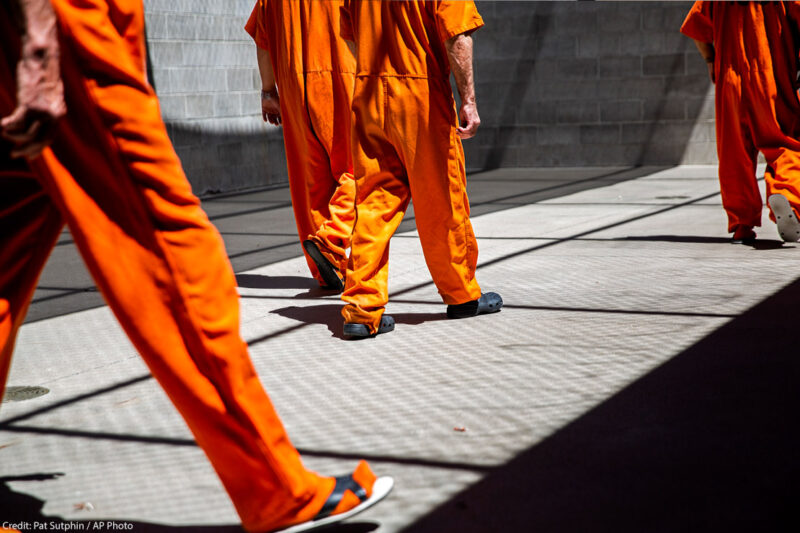Louisiana’s Suspension of Due Process Could Be a COVID-19 Catastrophe in Jails and Prisons


Louisiana has emerged as a COVID-19 hotspot, with among the highest contraction and growth rates in the nation. The state also has the highest prison and pretrial incarceration rates in the world. Those two facts might not seem related, but they are already interacting in a tragic way: Conditions in jails and prisons make them highly vulnerable to COVID-19, allowing the virus to spread like wildfire. The potential impact could be devastating for incarcerated people and the broader community, which is already under immense strain. Already, five people incarcerated at a federal prison in Oakdale have died from coronavirus complications.
The ACLU of Louisiana is fighting back on multiple fronts. This week, we filed a lawsuit against Oakdale Federal Prison to release people who are most vulnerable to COVID-19. Last week, in response to a troubling executive order, we sent a letter calling on courts to honor legal timelines for the filing of charges for people in custody, and to uphold due process rights during the pandemic. We are also demanding evidence-based plans for the prevention and management of COVID-19 in state prisons, jails, and juvenile facilities.
Public officials should be doing everything they can to stop the spread of the coronavirus. Instead, buried in Gov. John Bel Edwards’ recent emergency executive order is a provision that could do the opposite. The order suspends legal deadlines for district attorneys to file charges against people held in jail, which violates due process rights by leaving thousands of Louisianans to languish in legal limbo — many held without charge or even access to counsel. Our landmark report of Louisiana’s pretrial system — “Justice Can’t Wait” — found that 57 percent of those incarcerated in our jails are being held for a low-level offense, without charge or conviction.
History tells us that the consequences of suspending due process at a time of emergency could be disastrous. During Hurricane Katrina, the state issued a similar order to suspend court deadlines to present charges or release people from prisons and jails. The result was catastrophic: thousands were stuck in unlawful detention as a historic disaster inundated Louisiana. As flood waters rose, deputies at the Orleans Parish Prison abandoned their posts and left hundreds of people in their cells, some standing in sewage-tainted water up to their chests in the dark, powerless jail. People went days without food, water, and ventilation. Even some prison guards were left locked in their posts to fend for themselves, without any evacuation plan or emergency training. Then, like now, many of those stuck in jail during the emergency had not been charged.
We face a very different disaster in COVID-19, but the lessons of Katrina remain. Louisiana must not abandon people in jails and prisons as a deadly virus sweeps through the state.
Public health experts and law enforcement officials have warned that jails are “petri dishes” for the spread of COVID-19. Social distancing is impossible in jails, prisons, and detention sites, where sometimes dozens of people are crowded into single cells. It’s also difficult to practice good hygiene, with limited access to soap and water. Hand sanitizer is often considered contraband. These conditions make these facilities a breeding ground for contagious infections and diseases. The larger the number of individuals incarcerated, the higher the likelihood and scope of a related outbreak.
Incarcerated people are not the only ones at risk of contracting COVID-19 — corrections officers are also highly vulnerable. And because these employees return home each night, they can unintentionally carry the virus back to their families and communities. Louisiana is already a COVID-19 hotspot, and the governor’s order to suspend court deadlines — thereby crowding more people into jails and prisons — is a disaster in the making.
Black and brown communities are likely to bear the brunt of this disaster, as they did during Hurricane Katrina. Due to racial bias in the criminal justice system, people of color are more likely to be arrested and charged, and are often handed longer sentences than white people for the same offenses. Nationwide, Black people already face higher infection and death rates for COVID-19, particularly in Louisiana, where about 70 percent of the people who have died are Black.
Stakeholders in the criminal legal system have the power to mitigate the risk presented by COVID-19. State Supreme Court Chief Justice Bernadette Johnson sent a letter calling on district judges to refuse to funnel even more people into the system. Police officers should use their discretion to issue warnings rather than making custodial arrests, and engage in creative, compassionate problem-solving. And finally, Gov. Edwards must lift the order to suspend court deadlines and release all those incarcerated who are vulnerable to COVID-19, starting with the elderly and those with underlying medical conditions. By taking these critical steps, we can stem the spread of coronavirus throughout jails, prisons, and the broader community.
Louisiana is already overwhelmed by the COVID-19 crisis. We cannot put even more people in harm’s way by continuing to needlessly crowd jails and prisons. We at the ACLU of Louisiana hope to work with the governor and the State Supreme Court to ensure that these emergency measures are implemented in a way that prevents us from repeating the terrible history of 2005, and protects the public from COVID-19. It is possible to both protect individual rights and protect the public, and we hope to work together to do so.

